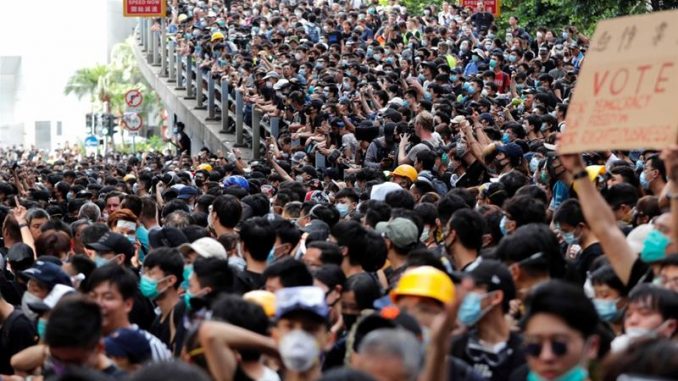
Erin Spencer, Staff Writer
Hong Kong erupted into protests last June when news of a bill that would allow individuals to be extradited to China was announced. This development would violate the “one country, two systems” agreement that was decided in the 1997 British handover. This agreement allows Hong Kong residents more independence and freedom than they would have in China. Residents were outraged at the possibility they could be extradited, claiming it jeopardizes their semi-autonomy from China. Considering the current realities of the Chinese legal system, there are documented cases where human rights have been denied, and those in custody have reported arrest without any evidence and torture; residents are fearing for their lives.
Hong Kong officials initially tried to claim this bill would protect Hong Kong from criminals attempting to escape the legal system. Officials also tried to ensure residents that the bill would in no way apply to issues of free speech; however, protesters were still skeptical. One online activist and native of Hong Kong, Joshua Wong, posted on July 8, 2019 that this bill was in fact passed despite the protests of Hong Kong residents and that it will remain in effect until July of next year.
The protests began with thousands of people gathering in the streets. The government attempted to break up these protests through excessive police force which included the use of tear gas and batons. The show of excessive force inspired even more residents to join the protests. By mid-June, approximately two million people took to the streets to join one of the largest protests in Hong Kong history.
The number and scale of protests have exploded over the past few months, successfully catching the attention of local and foreign media. Their message is simple: Hong Kong government officials are not acting in the interest of its people but on behalf of outside political agendas. The movement has five key demands of the government: withdraw the extradition bill, retract descriptions of the protests as a “riot,” drop all charges against protesters, investigate police force used during protests, and grant “universal suffrage.” Universal suffrage would mean Hong Kong voters would be able to directly select their leaders instead of the current system, which dictates Beijing is involved in the selection.
The latest news in Hong Kong reports the protest has moved to Hong Kong’s airport. Protesters began by warning travelers that they were not safe in Hong Kong. The protest escalated to blocking passengers from boarder planes and sitting down to block gate entrances. Over 1,000 residents were present at this protest, resulting in a 24 hour shut down of the Hong Kong airport. In addition to protesters gathering for sit-ins and rallies, other Hong Kong natives are going on strike to show their support. The workers of Hong Kong Disneyland all went on strike this August as well as the workers from the Hong Kong airport.
Protesters are grateful for the media attention from local and foreign organizations but are reserved about any other interference. The people of Hong Kong are protesting because they feel their voices are not being heard. While assistance from foreign bodies can be helpful, protesters do not want their government listening to any voices but their own. Hong Kong protesters are determined to be represented properly and hope that their government will understand that.
Leave a Reply